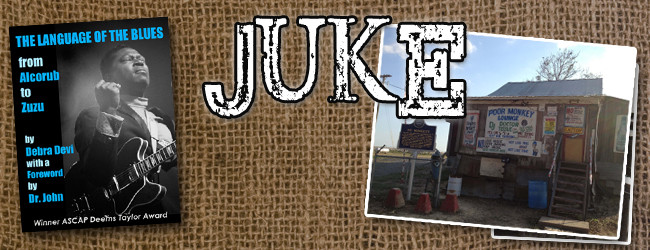
This is the latest installment of our weekly series, The Language of the Blues, in which author/rocker Debra Devi explores the meaning of a word or phrase found in the blues.
Grab a signed copy of Devi’s award-winning blues glossary The Language of the Blues: From Alcorub to ZuZu (Foreword by Dr. John) at Bluescentric.com. Also available as an eBook from Amazon Kindle.
A juke or juke joint is a funky little bar that provides dance music from a piano player, a band, or a jukebox. Jukes have also sometimes doubled as brothels, adding to their bad reputations among church-going folk. A juke might be a stand-alone business or a part-time business run from someone’s house, like the famous Po’ Monkey’s Juke that Willie “Po’ Monkey” Seaberry still operates out of his home in Merigold, MS.
Linguists have traced “juke” to the Gullah (Georgia Sea Islands) word jog, meaning “disorderly.” That word was traced, in turn, to the Bambara tribe’s dzugu, which means “wicked.” There’s also the Wolof word dzug, which means to misbehave or lead a wild life, and the Bantu juka, which means to rise up and do your own thing!
In From Juba to Jive: A Dictionary of African-American Slang, Clarence Major wrote that “jook” is an “African word meaning to jab or poke–as in sexual intercourse.” Alligator Records founder Bruce Iglauer told me: “Juke or jook is a term that I’ve heard older musicians use to refer to a particular sexual activity. Hound Dog [Taylor] used it as a verb to describe manual stimulation of the female genitals, including manual insertion of a finger…he obviously considered this a form of foreplay.”
Bluesmen used juke as a catch-all verb for their lifestyle, as in “I’m gonna juke forty years more and then join the church.” The blues was looked upon as wicked by Southern church-going people, especially by the sanctified members of the Church of God in Christ, which was very popular in Delta towns in Mississippi. Members were allowed to dance, sing and raise the roof during the services, but were forbidden from singing or dancing outside the church.
The sanctified preachers loved to give blues musicians tongue lashings from the pulpit. As musician James Thomas explained to William Ferris in Blues from the Delta, “It’s just like if you was singing the blues right now and you die, well, they say you gone to hell because you was singing the blues.” Some bluesmen planned to dodge this fate by eventually returning to the church. Some, like Little Richard and Al Green, became ordained ministers.
Playing the blues was not allowed inside many African American homes in the South. Pianist Henry Gray, who played in the Howlin’ Wolf band in Chicago from 1956 to 1968, was born in Kenner, Louisiana in 1925. Gray told me he began playing piano “when I was about eight years old. I taught myself. The blues was really popular when I was growing up, yes indeed. Stuff like Big Maceo, Tampa Red, Memphis Minnie, all that old-time blues.” Gray was forbidden to play the blues on the piano at home, though. His parents steered him toward the local church, where he played the organ and piano.
At age sixteen, Gray was asked to play with a band at a local juke joint. He wanted to play the gig but was scared to ask his parents. Gray finally worked up the nerve to ask his father, who agreed to let him play the show, but insisted on accompanying him to the club. “Well,” Gray said, “he saw that it was alright, and that I could make some money at it, so he let me start playing at the jukes, so long as he could keep an eye on me.”
To learn lots more, pick up a copy of The Language of the Blues today!
Pick up a copy of Language of the Blues
Songs:
“Early In The Morning”- Charlie Musslewhite
“Juke”- Little Walter (Walter Marion Jacobs)
“Juke Joint Is Calling Me” and “A Juke Joint in My House”- Little Milton (Milton Campbell, Jr.)
Video:
Little Milton Campbell – “A Juke Joint in My House”

